Katherine Ensor works on the theoretical and computational development of statistical methods for practical problems. Her primary emphasis is the analysis of dependent data as it relates to finance and risk management, energy, environmental statistics and urban analytics.
Research areas include: Time series, including categorical time series, spatial statistics, spatial-temporal methods, stochastic simulation, hierarchical modeling, information integration, stochastic process modeling, and estimation.
CURRENT EDITORIAL APPOINTMENTS
Editor, Applied Stochastic Models in Business and Industry
Acquisition Editor, WIRES Computational Statistics
COMPUTATIONAL FINANCE AND RISK MANAGEMENT:
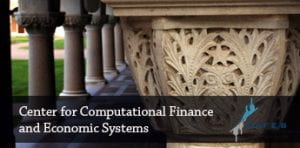 Ensor helped found the Center for Computational Finance and Economic Systems (CoFES) and has been the center’s director since it was established in 2002. CoFES has had many successes since these early years. The center maintains a curriculum open to undergraduate and graduate students. As a multidisciplinary center, CoFES has a strong history of collaboration between leaders in Rice’s George R. Brown School of Engineering and Computing, School of Social Sciences, and Jones School of Business who have worked to deliver world-class research, expand education and advance public knowledge. Since 2007, the Departments of Statistics and Economics have supported the undergraduate minor in Financial Computation and Modeling (FCAM). A graduate specialization in financial statistics and risk management was integrated into the Professional Master’s in Statistics (MStat) program in 2010.
Ensor helped found the Center for Computational Finance and Economic Systems (CoFES) and has been the center’s director since it was established in 2002. CoFES has had many successes since these early years. The center maintains a curriculum open to undergraduate and graduate students. As a multidisciplinary center, CoFES has a strong history of collaboration between leaders in Rice’s George R. Brown School of Engineering and Computing, School of Social Sciences, and Jones School of Business who have worked to deliver world-class research, expand education and advance public knowledge. Since 2007, the Departments of Statistics and Economics have supported the undergraduate minor in Financial Computation and Modeling (FCAM). A graduate specialization in financial statistics and risk management was integrated into the Professional Master’s in Statistics (MStat) program in 2010.
COMMUNITY ANALYTICS:
Ensor’s interest and commitment to this area have grown from her environmental and health-based research efforts.
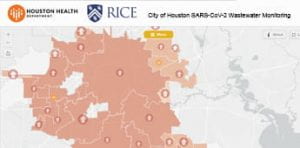 Wastewater-based Epidemiology: Ensor and project co-leaders Loren Hopkins, chief environmental science officer for the Houston Health Department and a professor in the practice of statistics at Rice, and Lauren Stadler, an associate professor of civil and environmental engineering, are working with investigators at Rice, the Houston Health Department, and the Houston Department of Public Works to grow Houston Wastewater Epidemiology. Established in May 2020, the interinstitutional effort has tracked COVID-19 and variants of concern, as well as RSV, influenza, mpox, and 29 potential pathogens through Houston’s wastewater treatment system.
Wastewater-based Epidemiology: Ensor and project co-leaders Loren Hopkins, chief environmental science officer for the Houston Health Department and a professor in the practice of statistics at Rice, and Lauren Stadler, an associate professor of civil and environmental engineering, are working with investigators at Rice, the Houston Health Department, and the Houston Department of Public Works to grow Houston Wastewater Epidemiology. Established in May 2020, the interinstitutional effort has tracked COVID-19 and variants of concern, as well as RSV, influenza, mpox, and 29 potential pathogens through Houston’s wastewater treatment system.
In August 2022, Houston Wastewater Epidemiology was named a National Wastewater Surveillance System Center of Excellence by the Centers for Disease Control and Prevention (CDC). Studies have shown evidence that predictive metrics of infection dynamics and disease prevalence can be tracked in near-real-time with geographic resolution. The dashboard that displays wastewater virus levels was launched on September 22, 2021. The center’s efforts in science and innovation have led to several manuscripts.
STATISTICS AND THE ENVIRONMENT:
Urban analytics requires the best of our statistical thinking, coupled with a willingness to engage local governments, NGOs, and communities to improve our quality of life.
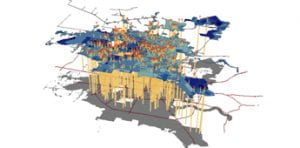 Ensor collaborates with cross-disciplinary groups of educators, researchers, and city and public health professionals to pinpoint, monitor, and predict public health risks from exposure to environmental contaminants. This has included rigorous quantitative assessments of air quality for improved asthma management, identification of risk for cardiac arrest, and exposure to lead poisoning and cancer-causing substances in the environment. Much of this research is with collaborator Loren Hopkins and the Kinder Institute for Urban Research, Urban Health Program.
Ensor collaborates with cross-disciplinary groups of educators, researchers, and city and public health professionals to pinpoint, monitor, and predict public health risks from exposure to environmental contaminants. This has included rigorous quantitative assessments of air quality for improved asthma management, identification of risk for cardiac arrest, and exposure to lead poisoning and cancer-causing substances in the environment. Much of this research is with collaborator Loren Hopkins and the Kinder Institute for Urban Research, Urban Health Program.
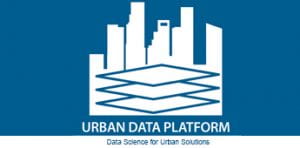 Kinder UDP: From 2016 through 2022, Ensor served as the founding director and creator of the Kinder Urban Data Platform (UDP) to support research advancing the greater Houston region. Data published to this site becomes part of the permanent data history of Houston, with each data set receiving a d.o.i. It has proven significantly beneficial to Houston’s success and brings national and international research attention to the Houston region. Major research projects of the UDP include the Texas Flood Registry and the COVID-19 Registry.
Kinder UDP: From 2016 through 2022, Ensor served as the founding director and creator of the Kinder Urban Data Platform (UDP) to support research advancing the greater Houston region. Data published to this site becomes part of the permanent data history of Houston, with each data set receiving a d.o.i. It has proven significantly beneficial to Houston’s success and brings national and international research attention to the Houston region. Major research projects of the UDP include the Texas Flood Registry and the COVID-19 Registry.
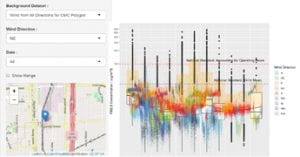 In 2019, Ensor deployed her FIRST SHINY APP(!!). The project is part of a system for real-time monitoring of permitted locations in Houston based on data obtained from monitors placed on the city fleet of vehicles. As the cars naturally pass by the site, the tool grows in its scientific message. This work was in collaboration with the Houston Health Department and the Environmental Defense Fund. The app is available at https://kinderudp.shinyapps.io/app_02062020/.
In 2019, Ensor deployed her FIRST SHINY APP(!!). The project is part of a system for real-time monitoring of permitted locations in Houston based on data obtained from monitors placed on the city fleet of vehicles. As the cars naturally pass by the site, the tool grows in its scientific message. This work was in collaboration with the Houston Health Department and the Environmental Defense Fund. The app is available at https://kinderudp.shinyapps.io/app_02062020/.
 Data Privacy: In January 2019, The Kinder UDP in collaboration with the Kinder Institute and the Ken Kennedy Institute hosted a power-packed one-day Symposium on Data Privacy.
Data Privacy: In January 2019, The Kinder UDP in collaboration with the Kinder Institute and the Ken Kennedy Institute hosted a power-packed one-day Symposium on Data Privacy.
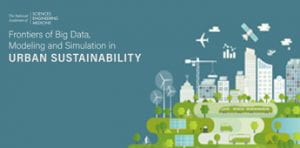 NASEM: In 2019, Ensor co-led a workshop on Big Data, Models and Simulation for Sustainable Cities for the National Academies of Science, Engineering and Medicine. The highly successful workshop was followed by an equally successful webinar series on the same topic. Key statistical issues in small area spatial estimation, data privacy, quality and availability, and the rising role of urban analytics were featured in both series. For more information on the NASEM effort, check out the recordings and proceedings.
NASEM: In 2019, Ensor co-led a workshop on Big Data, Models and Simulation for Sustainable Cities for the National Academies of Science, Engineering and Medicine. The highly successful workshop was followed by an equally successful webinar series on the same topic. Key statistical issues in small area spatial estimation, data privacy, quality and availability, and the rising role of urban analytics were featured in both series. For more information on the NASEM effort, check out the recordings and proceedings.
CURRENT/RECENT FUNDED RESEARCH and INFRASTRUCTURE PROJECTS
- Centers for Disease Control and Prevention (CDC) grant to run a National Wastewater Surveillance System Center of Excellence. (2022-Present)
- Eubank Endowment for the Center for Computational Finance and Economic Systems (ongoing)
- Brown Foundation Grant (2010-2020, PI). Graduate student support for CoFES.
- Rice Creative Ventures Fund (2020). Funding to support the annual NSF/NBER Time Series Conference to be held in September 2020.
- Houston Health Department (2020) Real-Time Benzene Mapping and Decision Support During Environmental Events
- Houston Solutions Lab (2019-2020) Real-Time Benzene Mapping and Decision Support During Environmental Events
- Houston Endowment (2020-2022) (Co-PI) Kinder Institute Urban Data Platform
- Environmental Defense Fund (2019) ($60K). Site Analytics and Quality Control Based from Hyperlocal Air Quality Measurements
- Rice Creative Ventures Fund (2019) Funding to support a conference on Data Privacy
- Environmental Defense Fund (2018) ($35K). Assessing Air Quality from Monitors Placed on City Cars.
- NIH (2018-2020) (Co-PI $430,375) Time Sensitive Award Mechanism – Using Exposure Science to Identify Populations at Risk in the Aftermath of Hurricane Harvey. Created the Texas Flood Registry.
- NIH 17-0661 (PRIME). (2017-2022) (Co-PI $2,713,280). Assessing the Impact of Multiple Environmental Social Stressors on Early Childhood Educational Outcomes.
- Houston Endowment (2016-2019) ($7 million – collaborative; $2.2 million Ensor) – Kinder Institute for Urban Data Platform

